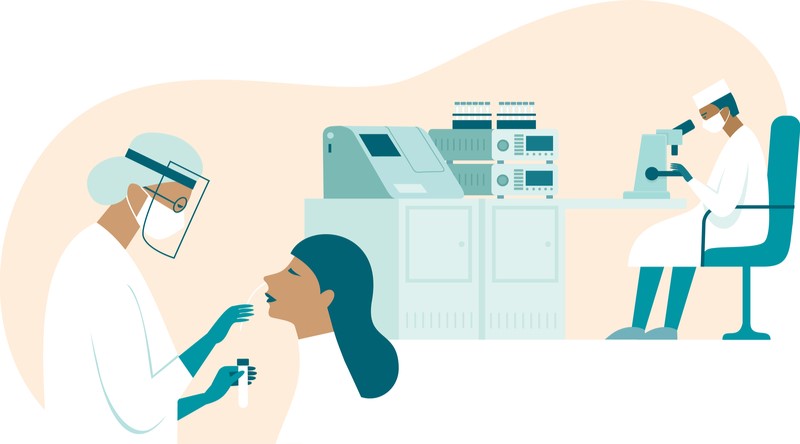Newsletter Signup - Under Article / In Page
"*" indicates required fields
The US medtech firm Hologic has bought the Finnish-French biotech Mobidiag for around €668M in the latest of a series of mergers, acquisitions, and stock market launches taking over the diagnostics market.
Hologic’s move is the latest in a flurry of activity from the women’s health specialist, which has snapped up Diagenode in Belgium, Biotheranostics in the US, and Somatex in Germany this year alone.
This is just one example of the many financial transactions happening in the diagnostics market over the past few months, with major deals, increasing stock prices, and unprecedented revenues.
Cancer diagnostics such as liquid biopsies have seen a particular surge in interest, with the US sequencing giant Illumina’s €6.6B acquisition of the California-based liquid biopsy firm Grail last year and the completion of a €1.8B acquisition of US-based firm Thrive Earlier Detection Corp. by Exact Sciences Corp.
“We expect this trend to continue if not to intensify,” said Christian Hense, COO of the Spanish in-vitro diagnostics company Universal Diagnostics, which is developing a blood-based screening test for colon cancer and adenoma.
According to Hense, diagnostics companies have been filing for IPOs and profiting from the current boom of special purpose acquisition companies (SPACs). These are companies specifically created to raise capital through an IPO in order to acquire an existing, operating company.
The vehicle was used as recently as this month, when UK diagnostics company LumiraDx announced it was listing on Nasdaq through a merger worth €4.2B with a SPAC named CA Healthcare Acquisition Corp. LumiraDx is a major producer of Covid-19 tests, and last year launched a partnership to make rapid tests available in remote African communities.
Meret Gaugler, Head of Investment Strategy at the medtech private equity firm Endeavour Vision, told me that, historically, few venture capital funds have specialized, or even been interested, in diagnostics.
“The perception used to be that diagnostics tended to carry similar development risk to a drug without the potential return of similarly large addressable markets. That perception has changed over the course of the past year,” Gaugler said.
The coronavirus pandemic has undoubtedly had a radical impact on the diagnostics field. Several diagnostics companies have benefited enormously from swiftly steering their business models to deal with the surge in testing.
Centogene is one such company. The German diagnostics firm expanded from rare disease into Covid-19 testing at 10 German walk-in centers and has seen record revenues as a result. According to Centogene’s full-year financial results released last week, 2020 revenues hit €128.4M, more than doubling those of 2019. Commercial Covid-19 testing brought in €59.8M in the fourth quarter of 2020 alone.

Gaugler told me the pandemic has focused investors’ attention on diagnostic companies that were able to react swiftly to the crisis, showcasing fast development turnarounds and nimble business models.
Nonetheless, she stressed the importance of selective investing. “Not all companies that have been able to showcase innovation and speed during the pandemic are necessarily far advanced in proving their staying power post Covid.”
“Covid testing as a driver of additional revenue has given certain publicly-listed diagnostics companies incremental cash to spend, attractively valued stock as an acquisition currency, and [created] an urgency to buy growth in order to plug the hole the abating pandemic leaves in its wake.”
“With the tail end of high-volume Covid testing coming into sight, many of these stocks have started to correct downwards.”
However, the demand for Covid-19 testing may not dry up completely. Scientists remain unsure how long protection lasts following Covid-19 vaccination, and just this month Pfizer CEO Albert Bourla raised the prospect of boosters and annual vaccinations.
In addition, the Dutch government is running a project called Fieldlab, which tests whether large-scale music and sporting events can be held for people with a very recent negative Covid-19 test. If results support this measure, it could further fuel testing demand.
Geert-Jan Mulder from the Dutch venture capital firm Forbion cautions that some quick Covid tests are failing to detect up to two in every five patients that would normally be confirmed as positive using the gold-standard PCR test.
“With quick tests, you are actually missing Covid-infected patients that, although they assume to be negative, in fact are not and can continue to transmit the disease. It’s especially dangerous if they are asymptomatic,” Mulder warned.
A further revenue stream for diagnostics companies will be the need for diagnostic testing and procedures for other conditions such as cancer to clear waiting lists for patients whose diagnosis and treatment has been delayed as a result of the pandemic.
Gaugler predicted there would be increasing interest in emerging diagnostic applications, with the diagnostics market expected to grow massively over the next decade.
“Most visible here has been the incremental validation of emerging blood-based biopsies through high-profile acquisitions, a growing body of clinical evidence and improved regulatory and reimbursement clarity,” she explained.
“These liquid biopsies not only stand out for their potential to save lives and reduce healthcare spending, but they represent a relative novelty within the diagnostics sector for their potential to address a vast medium-term market, coming to compete with the most successful of drugs.”
Cover image from Elena Resko. Body text image from Shutterstock
Oncology R&D trends and breakthrough innovations







